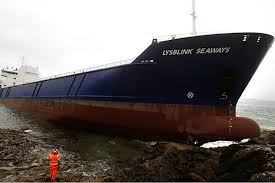Salvage & Recycling Services

Leeships offers a range of recovery, salvage and recycling services:
Leeships managment team appreciate the delicate nature of marine recovery, salvage and recycling work and undertake projects with care.
Leeships began in marine salvage and recover in 2012 and has since progressed into the provision of ship recycling/final delivery (final voyage) services.
The company ventured into the provision of ship recycling services having managed the delivery and beaching of several vessels for third-party ship owners. Leeships managers understand that the reasons for recycling vessels can vary however the process needs to be handled with great care given the environmental obligations placed upon the Ship Manager and Owner in the process of recycling. The vessels that we have recycled in the past have varied in size and type from older vessels that have exceeded their lifespan to vessels that have been purely recycled due to the prevailing market trading conditions at the time. Leeships works with certified ship recycling yards and end of life buyers in order to ensure the strictest standards possible are adhered to.
Leeships ship recycling services include:
Acquisition and management of end of life/near end of life assets (vessels/rigs/shore based installations)
Full or partial management of the recycling process including positioning, negotiating the sale, managing the delivery.
Monitoring the performance of ship recycling centres in order to encourage proper standards are adhered to.
It is important when possible to trade the vessel prior to recycling and wait the correct time when steel value pays its greatest dividend. In the past, we have traded vessels on the coastal trade until the right time and price was given by the receivers of the vessel. This option is available to our customers where we undertake charters that will cover all costs while waiting for recycling at the optimum time working with ship recycling centres that aim to adhere to the latest ship recycling conventions. To avoid delays, bans from ports, or even the loss of charters and liability claims, it is also vital for ship owners to comply with all regulations. The three main legal sources for the ship, recycling are the Hong Kong Convention of 2009, the EU regulations of 2013 and the Basel Convention of 1989.
Hong Kong Convention
The future of ship recycling is contained in the 2009 Hong Kong Convention for the Safe and Environmentally Sound Recycling of Ships. Among other things, it will require all ships to have an Inventory of Hazardous Materials (IHM) at all
times, set new operating standards for recycling yards, and introduce an enforcement mechanism that includes certification and reporting requirements. The convention will enter into force twenty-four months after being ratified by fifteen
IMO member states, representing at least 40% of the world cargo shipping capacity. More about the IMO can be found on their website including the latest changes to the convention.
EU Regulations
In 2013, the EU implemented the requirements of the Hong Kong Convention, taking an important step towards global implementation. The regulation applies to large commercial seagoing vessels flying the flag of an EU member state, but also to any other vessels calling at EU ports or anchorages. One of the most important upcoming requirements is that all visiting ships must have an Inventory of Hazardous Materials. More about the EU regulations can be found on their website including the latest changes to the regulations.
Basel Convention
Until the Hong Kong Convention is ratified, the Basel Convention on the Control of Transboundary Movements of Hazardous Wastes and Their Disposal applies to all end-of-life ships. The convention mainly regulates the movements of end-of-life ships to another country for recycling. More about the Basel Convention can be found on their website including the latest changes to the convention.
International Labour Organisation (ILO)
The International Labour Organisation is a UN agency devoted to promoting human rights and labour rights. As part of its efforts to advance the creation of decent work, the ILO has issued many guidelines for safety in the workplace, which we have incorporated into our working procedures and practices. More about the ILO can be found on their website including the latest changes to their recommendations.
Leeships ship recycling services include encourage all their counterparties to note and attempt to adhere to these conventions and will continue to highlight these regulations as and when possible as is the duty of any responsible shipping services group.


